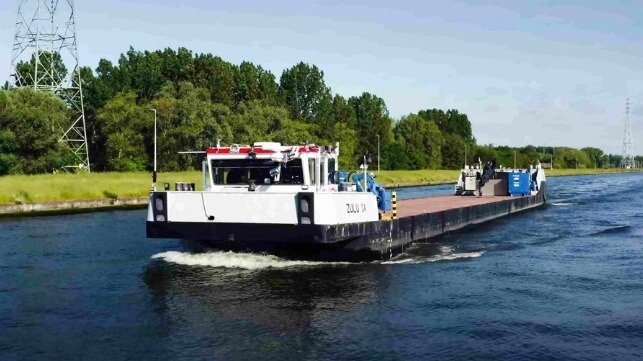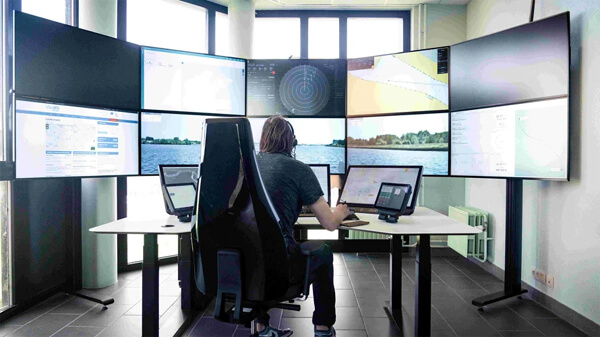Autonomous Vessel Operations Tested on Belgium’s Inland Waterways

Kongsberg Maritime completed its next demonstration of autonomous shipping technology using an inland waterway barge on a busy Belgian shipping route. It follows a similar recent demonstration in Norwegian coastal waters as part of the growing efforts to build experience and achieve certification for the technology. Kongsberg is also partnered in a number of pioneering projects in Norway that seek to be among the first to achieve autonomous shipping using vessels on the coast and in Norway’s fjords.
This latest demonstration was designed to test the operations in a busy inland waterway. The AUTOSHIP project, an EU-sponsored research effort to commercialize autonomous shipping, concentrated this test on a Class2 Pallet Shuttle Barge (PSB), the 164-foot long Zulu 4 owned by Blue Line Logistics. The vessel operates in the Flemish region around the port of Antwerp transporting goods on pallets, break-bulk, or containers with a capacity of 350 tons.
The vessel was upgraded with onboard control technology. It was also linked to an onshore remote operation center. Kongsberg reports technologies used in the trial included Autodocking, Autocrossing, and automatic navigation systems. The company has also developed cloud-based communications systems and advanced simulations to test and ensure that the vessel operated safely and optimally. A safety crew was onboard the vessel during the test.
The Zulu 4 completed a circuit starting from a port in Niel on the Rupel River and stretching about 10 miles. During the trip, the vessel entered a busy sea canal before traversing locks and passing several bridges as well as a yacht club and marina. As part of the test, Zulu 4 maneuvered and navigated on unrestricted waterways, and it demonstrated berthing and unberthing capability.
“We are delighted with the performance of the Zulu 4 on what is a challenging route through the busy Belgian waterways,” said Pål André Eriksen, Senior Vice President, Remote & Autonomous Solutions, at Kongsberg Maritime. “The course that the ZULU 4 completed provided an opportunity to test our technology in a real-life situation, where numerous maneuvers were performed successfully and safely.”

Operations are overseen from Kongberg's Remote Operations Center
According to Kongsberg, under remote monitoring from the Remote Operations Center, the team and vessel had to show situational awareness, engine and machinery monitoring, berthing/unberthing, and maneuvering in port. The same tasks were demonstrated under autonomous control, as well as collision avoidance, grounding avoidance, transit sailing, and automatic mooring. The Zulu 4 also demonstrated the ability to switch between autonomous operation and remote-controlled operation.

that matters most
Get the latest maritime news delivered to your inbox daily.
Last week the partners in the AUTOSHIP program completed the other major demonstration planned during the project. A Norwegian coastal cargo ship was operated for a voyage lasting 13 hours over 160 nautical miles. Together the two voyages were the first demonstrations planned by the project to highlight the advancements in the technology.
The aim of the AUTOSHIP project is to test and develop fully autonomous navigation systems, intelligent machinery systems, self-diagnostics, prognostics, and operation scheduling, as well as communication technology enabling a prominent level of cyber security and integrating the vessels into upgraded e-infrastructure.
